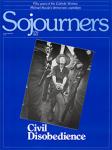To call the events initiated by Christians at the Pentagon or elsewhere "acts of worship" seems to me somewhat wide of the mark. Too public, too political, too endangering, too dramatic for that, a rather gentle classification.
Games certainly, celebrations - but serious, and played for keeps. After all, one can do an "act of worship" in the closet. Secret commerce with God is sometimes commended, sometimes practiced by Christ. But this is another matter entirely.
The atmosphere, the circumstances, are of import. Not only what you (plural) do at such places of ill fame, but the spirit, the accompaniment, the aura, sense of life you summon there.
A contrast occurs to me. Recently Mr. and Ms. Reagan were shown in the media, at prayer, in company with a group of TV evangelists. The surrounding news columns fairly bristled with danger, anger, provocation, like a gauntlet of spearheads, tipped with nuclear warheads. I thought of a Roman legion hemming in an emperor, as he invoked his god(s). The aura, atmosphere, surrounding the prayer was stark indeed; the prayer seemed to me a jeweled tooth in a grinning skull. Prayer side by side with unimaginable violence: the war budget rising and rising, a leaven of hell; aid to the poor dealt cut after cut to the heart.
Such prayer as was suggested by the photo seems to fit no biblical form. Neither the closet prayer, modest, effacing of self, typified by Christ in the desert, Christ fleeing to the mountains alone (ironically, "lest they make him king"). Nor, to summon the understatement of the century, does the photo suggest a politically risky, nonviolent drama of self-emptying - such as would be implied in, say, trespassing on forbidden nuclear ground, blocking doors, shedding and pouring abroad one's own blood.
When political acts are genuine, they enter the realm of the common good; they also honor the God of life, as liturgies. They link reverence for the earth with reverence for the Holy One. Such acts are also for the healing of the nations. They touch with skill, exactness, a kind of surgical mercy, some aspect of our illness. And if it be granted that the very worst of our ills, an illness literally unto death, is modern war, then something momentous follows.
Like this: such games, such celebrations, acts of political worship (a tautology if ever there was one) offer a vision of peace first of all to those who conduct them. They also (not as footnote or lagniappe [gratuity], but hyphenated-reality) hold out a like gift to others, including those who believe in war, those who pay for war, those who pray with one half a heart and make war with the other: those who pose at prayer for the media, to the liturgical beat of nuclear spears clashing.
On Martin Luther King Day, January 15, a number of New York Christians planned a game, celebration, at a welfare hotel in Times Square. There we prayed and sang, led by a street minister of the city. And from there we proceeded to the notorious Pentagon think tank, Riverside Research Institute, nearby. A number of us blocked entrances, poured blood and ashes, prayed, awaited the outcome.
Seventeen of our number were crowded together in a passageway, the guarded entrance of the labs. There for some three hours, we sat or stood, sweated it out, literally stuck, the doors chained behind, further passage forbidden.
It occurred to me later that we were miming a drama of paralysis and deliverance. Just like the scientists and engineers whose lives are stuck in this furnace of Mars, so were we stuck. Stuck symbolically, really, by our own choice, in that narrow purported passage which, in reality, was a setting for Sartre's play No Exit - a room that was a tomb, a shoddy room in hell.
We peered out, as do the employees day after day. As they peered on us, in anger or bewilderment. We could, in a matter of speaking, see. So could they, or so it was said. What we could see was what a school of fish might see, peering out of a tank bloodied by their own wounds.
We saw only death. The blood that ran was our own. And that was the rub, the moment of truth, the point at which politics and worship ran together; blood, the commonest coin of the realm, whether "given for you" in healing and reconciling, or wantonly wasted in violence.
We could hear nothing. We could only read the lips, the frowns and smiles, the anger or compliance or joy of friends, police, employees. Literally stuck, caged, stalemated like countless lives, the cheated lives of the poor, the self-deception, selfishness of the powerful.
Stuck indeed.
At the same time, we who do such things believe also in deliverance. Clumsily put, according to a kind of grammar of grace, such acts as ours can be understood only in the pluperfect tense, in the passive voice. Which is to say, we had been delivered ("freed from" is the root of the word) before the fact.
The first move in the game was up to God. For that grace, that beckoning, we could walk and walk, for that we could trespass in forbidden ground, for that could give of our blood, for that could face public obloquy. Delivered, before the fact. Rigorously, in the nature of things, the first move belonged to God. It was God (which is to say, in our regard, grace) which is defined as resistance, nonviolence. It is grace which is indictable, criminal.
Indeed, the game is well named: grace. God guards the outcome, for keeps.
Daniel Berrigan is a Sojourners contributing editor.

Got something to say about what you're reading? We value your feedback!
